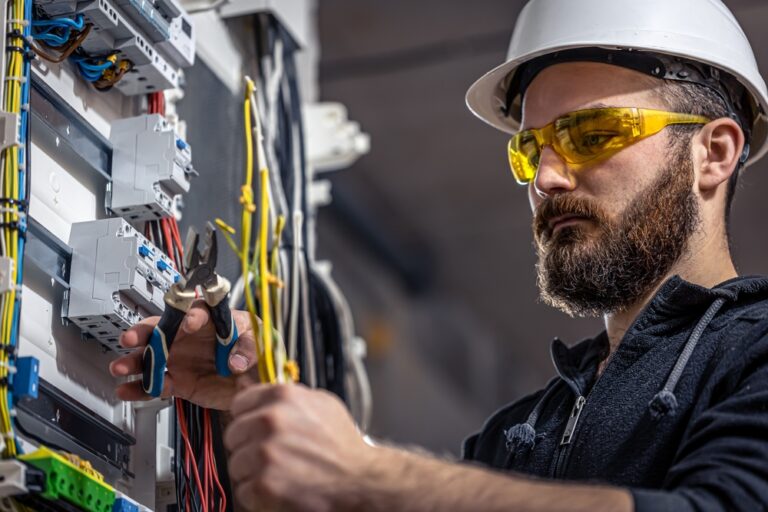Adherence to local and national electrical codes is not just a matter of regulatory compliance in residential and commercial electrical projects—it’s a critical component of safety, efficiency, and long-term reliability.
Established by various authorities, these codes are designed to ensure that electrical installations are performed to a high standard, minimizing risks and ensuring that electrical systems operate safely and effectively. Here is the importance of compliance with these codes, highlighting their impact on safety, legal liability, and overall project success of your planned electrical panel installation.
Understanding Electrical Codes
Electrical codes are sets of regulations that dictate electrical installation and maintenance standards. In the United States, the primary national code is the National Electrical Code (NEC), also known as NFPA 70, which is published by the National Fire Protection Association (NFPA).
The NEC provides a comprehensive framework for installing electrical wiring and equipment, aiming to protect people and property from electrical hazards.
Local jurisdictions may also have additional codes and regulations that complement or extend the NEC. These local codes can vary significantly depending on regional requirements and the community’s specific needs. Compliance with both national and local codes is mandatory for all electrical projects, whether residential or commercial.
Ensuring Safety
The foremost reason for adhering to electrical codes is safety. Electrical systems, if not installed or maintained correctly, can pose significant risks, including electrical shocks, fires, and equipment malfunctions.
The NEC and local codes are meticulously designed to prevent such hazards. They cover all aspects of electrical installations, from the materials used to the installation methods and the specifications for grounding and bonding.
Preventing Electrical Fires: Electrical codes stipulate the correct sizing of conductors, the proper use of circuit breakers and fuses, and the safe installation of wiring to prevent overheating and short circuits that can lead to fires.
Avoiding Electrical Shocks: Codes require proper grounding and bonding to ensure that any electrical faults are safely conducted to the ground, preventing shock hazards.
Ensuring Proper Functionality: Adhering to codes ensures that electrical systems function correctly, preventing disruptions and ensuring equipment operates within its intended specifications.
Legal and Financial Implications
Non-compliance with electrical codes can lead to significant legal and financial repercussions. Building inspectors routinely check for code compliance during and after construction, and failure to meet these standards can result in fines, project delays, and even the need for costly rework.
Legal Liability: Property owners and contractors can be held liable for damages resulting from non-compliance. This includes injury to persons, damage to property, and potential lawsuits.
Insurance Claims: Insurance companies may refuse to pay claims for damages caused by electrical systems that were not installed according to code. This can leave property owners facing substantial out-of-pocket expenses.
Property Value: Non-compliant electrical installations can negatively impact the value of a property. Prospective buyers or tenants may be deterred by the potential safety risks and the need for future corrective work.
Enhancing Project Efficiency and Reliability
Compliance with electrical codes ensures that electrical systems are reliable and efficient. This is particularly important in commercial settings where electrical disruptions can lead to significant operational losses.
Operational Continuity: Properly installed electrical systems are less likely to fail, ensuring continuous operation of critical business functions and reducing downtime.
Energy Efficiency: Electrical codes often require energy-efficient installations, which can reduce energy consumption and lower utility bills.
Future-Proofing: Adhering to current codes ensures that installations are current with the latest safety and efficiency standards, reducing the need for future upgrades and modifications.
Best Practices for Ensuring Compliance
Ensuring compliance with local and national electrical codes involves several best practices that property owners, contractors, and electricians should follow:
Stay Informed: Regularly update knowledge of both national and local electrical codes. The NEC is updated every three years, and local codes can change even more frequently.
Professional Expertise: Hire licensed and experienced electricians who are familiar with code requirements. Professional electricians are trained to understand and implement these codes correctly.
Regular Inspections: Conduct regular inspections of electrical systems to ensure ongoing compliance. This includes periodic reviews of existing installations and rigorous checks during new projects.
Detailed Documentation: Maintain detailed records of all electrical work performed, including plans, permits, and inspection reports. This documentation can be crucial in demonstrating compliance and resolving any disputes.
Engage with Local Authorities: Work closely with local building departments and inspectors. They can provide guidance on code requirements and help ensure that projects meet all necessary standards.
Compliance with local and national electrical codes is essential for the safety, legality, and efficiency of residential and commercial electrical projects. These codes provide a framework that protects people and property from electrical hazards, ensures reliable operation of electrical systems, and safeguards against legal and financial risks.
Staying informed, hiring qualified professionals, conducting regular inspections, maintaining detailed documentation, and engaging with local authorities, property owners, and contractors can ensure that their electrical installations meet all necessary standards. This commitment to compliance not only enhances the quality and safety of electrical systems but also contributes to the overall success and sustainability of construction and renovation projects.

